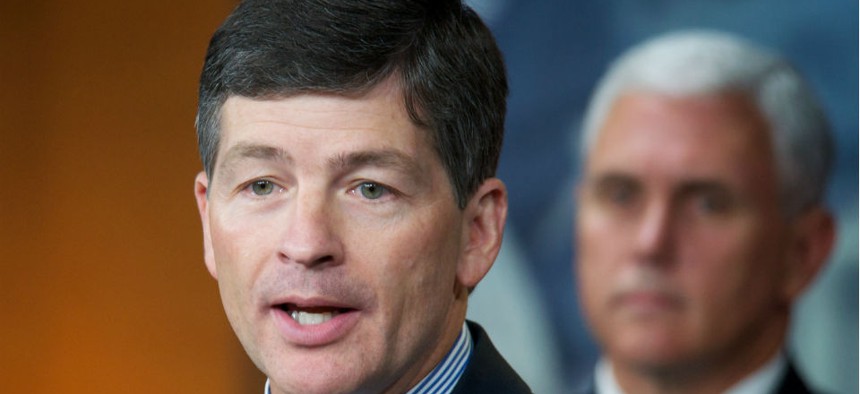
House Financial Services Committee Chairman Jeb Hensarling warns a long-term reauthorization may have to wait until the next Congress. Flicker user House GOP
Internal GOP Tensions Simmer Over Terrorism Insurance
Conservatives square off against some fellow Republicans, business groups, and Senate Democrats over TRIA program.
House and Senate negotiators remained at an impasse Tuesday on a deal to reauthorize a terrorism-risk insurance program, amid frustration within the House GOP conference and from business groups over the lack of movement.
Tensions bubbled again in a closed-door meeting of House Republicans, even as party leaders were preparing to take fallback action with a short-term reauthorization bill for the Terrorism Risk Insurance Act, or TRIA, by the end of this lame-duck session.
As part of this strategy, House Republicans will also seek to counter arguments that simply going along with a Senate Democratic version to reauthorize the program for seven years—approved 93-4 in July with nearly unanimous Senate Republican support—would be a better response.
"If Senate Democrats continue to insist on their 'my way or the highway' approach, I fear a long-term reauthorization may have to wait until the next Congress," House Financial Services Committee Chairman Jeb Hensarling warned in a statement.
Initially enacted after the Sept. 11, 2001, terror attacks, the federal cost-sharing program that provides a backstop in the event of another catastrophic attack is set to expire at the end of 2014.
On Tuesday, during a closed-door gathering of House Republicans, Rep. Peter King of New York spoke out about the urgency for the House to act—and openly questioned the continued opposition by some GOP colleagues, led by Hensarling, to the Senate-passed bill, sponsored by Democratic Sen. Chuck Schumer of New York.
That Senate measure would maintain the existing $100 million threshold for federal insurance to kick in and bring only minor changes, while reauthorizing the program for seven years. The federal backstop has never been needed, so far. And King argued that the program to date has not cost the government anything.
Even so, Hensarling and other Republicans oppose the Senate approach, and say bigger changes are needed to protect taxpayers. They want to raise the "trigger" for the federal aid to $500 million in damages in most types of attacks and make other alterations, as reflected in a bill passed by Hensarling's committee to extend the program for five years.
The business community has, for the most part, opposed Hensarling's approach. And Republican leaders haven't yet brought his bill to the floor for a vote—a sign of uncertainty that it would have even enough Republican support to pass.
Meanwhile, talks between Hensarling and Schumer have not yet yielded a compromise.
At one point during Tuesday's closed-door meeting, King even pointed out to colleagues that conservative stalwart Sens. Ted Cruz of Texas and Rand Paul of Kentucky joined nearly all Senate Republicans to support the Senate version. King also noted that the NFL, Major League Baseball, and NASCAR—citing concerns about stadiums being targeted in a terror attack—are among those who have joined a wide coalition of business groups urging Congress to act.
After his questioning of the ongoing opposition to the Senate bill, King says, he heard no one at the meeting disagree with him, or give a rebuttal.
But others said Hensarling did eventually respond during the meeting—only that King had left the room by then. Some in the room say the Texan was already fuming even before the meeting over a letter sent Monday by King and 44 other House Republicans to party leaders, urging action on renewing the terror insurance program. That letter had been circulated by Financial Services Committee member Stephen Fincher of Tennessee, a member of the Tea Party Caucus.
When Hensarling spoke, according to a source in the room, he took stark issue with the argument from the Senate and others that the House should pass the Senate bill because it passed that chamber with such significant bipartisan support.
Hensarling noted that the House itself also has passed dozens of bills with equally overwhelming bipartisan support—measures that the Senate has refused even to bring up for votes. So that argument doesn't hold much water, he argued.
Hensarling then told his colleagues, "That is why we are working to add several bipartisan bills the House passed as part of TRIA."
In a statement later released from his office, Hensarling said, "I share my colleagues' frustrations on TRIA negotiations because most Members support a long-term reauthorization. But Senate Democrats refuse to negotiate, even after I offered a compromise that moves more than halfway towards the Senate's TRIA bill with reasonable reforms. They not only rejected my compromise, they refuse—refuse—to negotiate."
Meanwhile, Marty DePoy, a spokesman for the Coalition to Insure Against Terrorism, on Tuesday said his group remains hopeful that an agreement can be reached to reauthorize TRIA for the long term. His group argues that each time TRIA nears its expiration, business owners struggle with the uncertainty and fear that they may no longer be able to obtain the coverage they need. The coalition's roster includes a wide range of members, from the American Bankers Insurance Association to the Institute of Real Estate Management, the Association of Art Museum Directors, and Hilton Worldwide.
"We have less than two weeks left this Congress, and there is widespread agreement among members of the House and Senate that a multi-year reauthorization of the program is critical," DePoy said in a statement. "A short-term fix would be potentially devastating to US businesses. Frankly, it's a risk we can't afford to take. Congress needs to act now."







